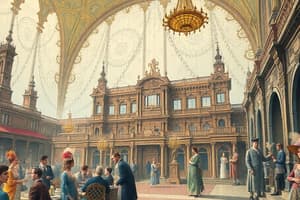Podcast
Questions and Answers
What were the three main classes that people in pre-revolutionary French society were divided into?
What were the three main classes that people in pre-revolutionary French society were divided into?
Nobility, clergy, and commoners
What percentage of the French population did the commoners make up in the pre-revolutionary society?
What percentage of the French population did the commoners make up in the pre-revolutionary society?
Around 95%
What privileges did the nobility enjoy in pre-revolutionary France?
What privileges did the nobility enjoy in pre-revolutionary France?
Exemption from taxes and great privileges
What role did the excessive spending and self-indulgence of the nobility play in pre-revolutionary France?
What role did the excessive spending and self-indulgence of the nobility play in pre-revolutionary France?
What are two key elements necessary for a successful revolution?
What are two key elements necessary for a successful revolution?
What is the importance of clear objectives in a revolution?
What is the importance of clear objectives in a revolution?
What were some of the external threats that helped galvanize France against its ruler before the French Revolution?
What were some of the external threats that helped galvanize France against its ruler before the French Revolution?
What event in October 1789 symbolized the discontent of the French populace and their protest against bread shortages?
What event in October 1789 symbolized the discontent of the French populace and their protest against bread shortages?
What was John Locke's emphasis in his philosophy that influenced the revolutionary spirit?
What was John Locke's emphasis in his philosophy that influenced the revolutionary spirit?
Which Enlightenment philosopher contributed to the idea of the separation of powers that influenced democratic governments?
Which Enlightenment philosopher contributed to the idea of the separation of powers that influenced democratic governments?
According to Jean-Jacques Rousseau's 'Social Contract,' what should be the basis of a government's legitimacy?
According to Jean-Jacques Rousseau's 'Social Contract,' what should be the basis of a government's legitimacy?
How did Immanuel Kant's ideas contribute to the revolutionary spirit during the French Revolution?
How did Immanuel Kant's ideas contribute to the revolutionary spirit during the French Revolution?
Flashcards are hidden until you start studying
Study Notes
Pre-Revolutionary French Society Structures
The structures of French society prior to the revolution were based on the feudal system, which was characterized by a rigid hierarchy and significant inequality. This system divided people into three main classes: nobility, clergy, and commoners. The nobility held the highest status and included kings, queens, dukes, counts, viscounts, barons, and other titled individuals. They were exempt from taxes and had great privileges. The clergy also enjoyed tax exemptions and extensive powers. Meanwhile, the majority of the population consisted of peasants who owned small plots of land and owed labor to their lords. Commoners made up around 95% of the populace, while the aristocracy accounted for only 1%.
These hierarchies created significant social and economic disparities. Nobles often lived lavishly while the poor endured harsh conditions. Many historians argue that this inequality played a crucial role in fueling the revolutionary spirit. The nobility's excessive spending and self-indulgence further widened the gap between them and the commoners. Moreover, many French citizens experienced famine during these years due to crop failures and government policies.
Key Elements of a Successful Revolution
A successful revolution requires several factors. Firstly, it necessitates strong leadership, clear objectives, and well-organized military forces. Secondly, a revolution must have broad popular support among different sectors of society. Lastly, external threats can help galvanize a nation against its ruler.
In France, high levels of poverty, increased unemployment, and an unpopular monarchy paved the way for widespread discontent. This dissatisfaction found expression through various movements such as the Women's March on Versailles in October 1789, where women from Paris protested against bread shortages.
Enlightenment Philosophers and Their Ideas
Enlightenment philosophers played a significant role in shaping the revolutionary spirit. They advocated for individual rights, equality, and the role of reason in guiding society.
-
John Locke: An English philosopher, Locke is often considered the father of liberalism. He emphasized the importance of individual rights and the idea that government should exist to protect these.
-
Montesquieu: A French philosopher, Montesquieu contributed to the idea of the separation of powers, which became a cornerstone of democratic governments.
-
Jean-Jacques Rousseau: Rousseau's "Social Contract" argued that citizens should have a voice in the government and that the government's legitimacy hinges on fulfilling the will of the people.
-
Immanuel Kant: Kant's ideas about the inherent value of human beings and their moral duties influenced the revolutionary spirit.
These philosophers, while not directly involved in the French Revolution, provided the intellectual framework that informed revolutionary ideals. Their ideas about individual rights, equality, and the role of reason in guiding society resonated with the discontented French populace and served as a catalyst for change.
While the French Revolution was a complex event with numerous factors contributing to its success, the ideas of Enlightenment philosophers played a crucial role in shaping the revolutionary spirit. The historical context of an unequal society coupled with the philosophical concepts of individual rights, equality, and the power of reason set the stage for one of the most transformative periods in human history.
Studying That Suits You
Use AI to generate personalized quizzes and flashcards to suit your learning preferences.




